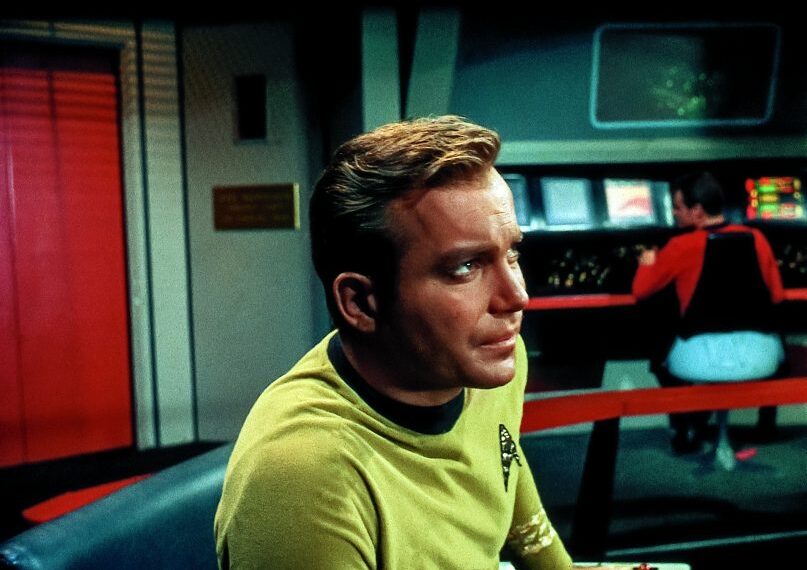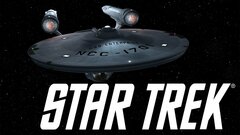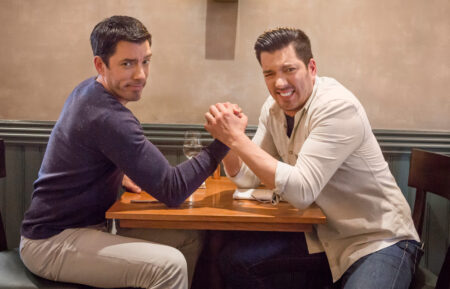William Shatner on ‘Star Trek’s 50th, Trekkers, and Being a Pain in the You-Know-Where

He told us to “get a life!” Fortunately, he didn’t take his own advice.
William Shatner, known the world over for his role as the indomitable James T. Kirk, has had an insanely busy and lucrative career packed with science fiction–infused projects: memoirs, novels, documentaries, comics, blogs, web series, video games and a Broadway show. He’ll even set sail with fans on a Star Trek cruise in 2017.
But while Shatner’s years aboard the Enterprise did not define him—lest we forget, he also met great success as T.J. Hooker, Denny Crane and that Priceline negotiator guy—they have certainly made the 85-year-old star an icon for the ages. And there’s nothing final about his frontier!
RELATED: As Star Trek Turns 50, Gene Roddenberry’s Vision Endures
How are you feeling about Star Trek hitting the half-century mark? Joy? Satisfaction? Acceptance? Denial? All of that, and more. Can you imagine?
The idea that Star Trek is 50 f—ing years old is unbelievable to me! I can’t wrap my brain around it. How is it possible that a piece of entertainment that was never a ratings winner and always on the verge of cancellation is somehow still with us? It’s not like it ran long enough to become part of the social fabric. It was three years and out. The day we got the ax, that was the end of it. [Laughs] Or so we thought. None of us had a flicker of thought that the show would live on. Even after we started making the Star Trek films, it didn’t seem like there was any real future in them. We’d finish a movie and Paramount would burn down the sets and we’d think, “Well, that’s that.”
You seem noncommittal when it comes to picking your favorite Trek episode. On some occasions, you’ve said it’s “The City on the Edge of Forever.” But in your book Star Trek Memories you claim it’s “The Devil in the Dark.” What’s the deal?
Oh, I guess it’s “The Devil in the Dark.” That episode still holds water. It’s a good one to go with.
Gee, such enthusiasm!
Oh, I just don’t think much in those terms. But it was a good script with a good message, about this animal we think is beastly but is just protecting its young. What I remember most about shooting that one is that my father died right in the middle of it. I had to go and bury him and then come back and finish the episode. Everybody felt so bad for me, which I really appreciated. I tried to make the cast and crew feel better by cracking a joke, only I did it just as Leonard Nimoy was trying to perform. I offended him for a day or two.
When Star Trek premiered, sci-fi was strictly on the fringe. Now it’s everywhere. It’s the entertainment genre of choice, not just in the U.S. but globally. How do you account for that sea change?
I’ve tried for years to figure out what’s going on. I wrote a book called Get a Life!, in which I asked why people were going to the conventions. I concluded that they came to be with each other, to have a sense of community, to know they weren’t alone in their passion for Star Trek.
But then I dug deeper in a documentary I also called Get a Life!, and that’s when I really connected with what our love of science fiction is all about. It’s as old as we are! The ancient Greeks found large bones—which we now know to be dinosaur bones—and they needed to explain what they couldn’t understand, so they came up with a story about giants who were half-gods. We human beings are very much the same today, only now there is so much more that needs explaining and so much more for us to worry about. That’s why we line up to see superhero movies and read comics and partake in the ritual of a convention. It’s kind of like religion. We’re never truly going to understand what lies beyond, so we must rely on faith. Science fiction requires faith too, and a great deal of imagination.
You could not tell fans to “get a life” today and have the same impact you did on Saturday Night Live in 1986. Being a nerd or a geek, or a Trekkie or a Trekker, is now a badge of honor.
I still think people should get a life, but for a whole different reason. I just spent a week with my 13-year-old granddaughter, and it really helped me come to grips with what’s going on out there today. For one entire week, this young lady never put her phone down! She even went to sleep with it. For her, it is a means of instant communication, yet what kind of communication is that, really? Nobody talks anymore! It is also a means of instant gratification, but gratification brought on by what? Taking a picture and sending it out to the world, all in six seconds? That phone is a fountain of knowledge—it can put the British Library and the Library of Congress right at our fingertips—but it is also a dagger pointing straight at our brains.
You do know you started this whole cell phone thing, right?
The Star Trek communicator! You know, it never really hit me until sometime in the mid-’90s just how prophetic we were. I was in the middle of an airport and needed to make a call and somebody handed me a Motorola StarTAC phone. There I am using it and suddenly everyone around me is laughing. It took me a while to get the joke.
RELATED: William Shatner Looks Back at His Most Iconic Roles
In your first interview you gave TV Guide Magazine back in 1966, the author states you had been on the verge of giving up acting if the Star Trek pilot hadn’t sold. Seriously?
I don’t remember that at all. What I do remember is that the great radio dramatist and poet Norman Corwin had written a play for me, and we had opened it at the University of Utah to try it out. We were on our way to Broadway with the piece when I got the call that this outer-space pilot I’d made several months earlier had been sold as a series. So I don’t remember being at my wit’s end. But I do recall having to give up a very beautiful play. [Laughs] No regrets, though.
Also in this article, Gene Roddenberry recalled you coming up to him on Day One of production with several suggestions about how to improve the script.
I don’t recall that either. But I have always considered myself to be a burgeoning writer, so it’s probably true. Being a pain in the ass is my fondest memory when I look back on my Star Trek days. [Laughs] And I’m still a pain in the ass!







